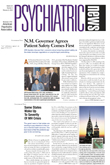Autism typically strikes preschool-age children, changing forever their lives and those of their families. One parent described the onset of autism as an “unwanted intruder who stole [her] son’s mind and personality and left his bewildered body behind.”
Jon Shestack, representing Cure Autism Now (CAN), a parent-led organization to advance biomedical research, spoke at the first national summit on autism organized by federal health and education agencies. The conference was held last November in Washington, D.C.
A decade ago, according to Shestack, few scientists were devoted to autism research in the entire country and funding was scarce.
“To accelerate the pace of autism research, several parents including us formed CAN in 1995 about the same time psychiatrist Eric London, M.D., and his wife, Karen, formed the National Alliance for Autism Research,” said Stestack.
The Londons’ son, Zachary, is autistic, and the couple was frustrated by the slow pace of autism research and lack of funding.
Both CAN and NAAR have raised millions of dollars to fund pilot research projects and advance awareness of the disorder. Their efforts are paying off.
Thomas Insel, M.D., director of the National Institute of Mental Health, who introduced Shestack at the summit, said, “He has led the charge in waking us scientists up to the importance of this disorder as a public health problem.”
The rate of diagnosed autism cases has nearly doubled in the last decade from 1 in 500 children to 1 in 250 children. Scientists consider autism to be a spectrum disorder with symptoms ranging from mild to severe.
CAN initiated the Autism Genetics Resource Exchange, which will be shared with several research teams in the new collaborative Autism Genome Project announced at the summit. The project is the largest research collaboration ever assembled to determine the genes associated with the complex autism-spectrum disorders.
NAAR will collaborate on the genome project with the NIMH, National Institute of Child Health and Human Development (NICHD), National Institute of Neurological Disorders and Stroke, and National Institute of Deafness and Other Communication Disorders, according to NAAR Chair Prisca Chen Marvin.
The other research teams participating in the Autism Genome Project are affiliated with the Autism Genetics Cooperative, the International Molecular Genetic Study of Autism Consortium, and the Collaborative Programs of Excellence.
NAAR announced that it has committed $2 million to the project, and the four research institutes collectively committed $2.5 million.
“By pooling our resources and working together, we increase our chances of creating significant breakthroughs in the next five to 10 years that can improve the lives of families affected by autism,” said Marvin at the summit.
“Unraveling the complex genetics of autism-spectrum disorders will require the kind of statistical power afforded only by pooling of DNA samples and data from ever larger numbers of affected families,” said Insel at the summit.
Marvin announced another collaborative project with NICHD at the summit. The multisite High Risk/Baby Sibling Autism Research Project focuses on early diagnosis of autism-spectrum disorders and identifying biological and behavioral markers. The population under study is at high risk for developing autism: the infant siblings of children with autism. NAAR, which funded pilot studies for the last five years, has committed $700,000 to the new collaboration with NICHD.
Information about the two NAAR/NIH collaborative research projects is posted online at www.naar.org/news/render_pr.asp?intNewsItemID=149. ▪
